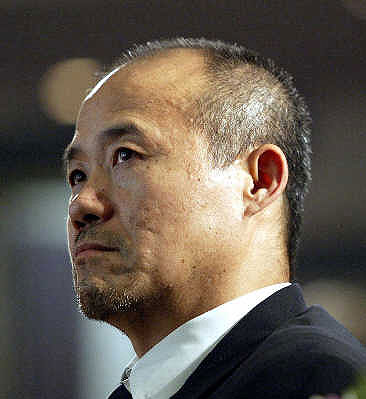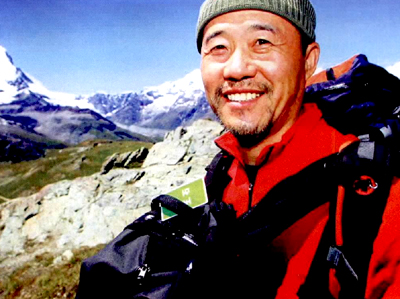|

|
|
Clad in a black suit, he gives off the vibe of a successful entrepreneu. |
"Many people think the economic boom will fizzle out shortly, but I think it is just beginning," says Wang Shi, a real estate tycoon in China.
Wang Shi is a successful guy. Not a few of his peers view him as a model to emulate in all ways, even including his hobby of mountain climbing.
His character tallies with the spirit of our times: optimistic and active, adventurous and hardheaded, tough and curious. A peek into Wang's personal experience as a soldier, student, worker and businessman affords a revealing snapshot of modern China over last three decades.
He admitted in an interview with the Xinmin Weekly earlier this year that in his wildest imagination he had never dreamed of what he now has achieved.
An enigmatic outer world
Shenzhen, a booming southern city, is the cradle of Wang's career as the founder of Vanke Group, a modern Chinese real estate giant. But if not for the governmental sponsored Shenzhen Special Economic Zone Wang Shi, would have led a very different life.
Wang went to Shenzhen for the first time in 1978. At that time, he worked as a technician for a railway department in Guangzhou. He was sent to Shenzhen to be a project superintendent. For Shenzhen residents, he was simply an outsider; for him, Shenzhen was only an innocuous border city.
With a work shed as his accommodation, a rancid place filled with a fetish smells from decomposed organic substances and flies buzzing about, Wang displayed lukewarm interest in his job. Being unable to speak the local dialect, Cantonese, the man felt alienated from the local people and so he secluded himself in his own room, reading and sleeping under the mosquito net.
He recalls piece of border territory across from Hong Kong that had been brought under close guard for decades. Only with special permission could people approach or enter the checkpoint. Wang Shi was allowed to visit it because he worked for the state railway. Standing on the footbridge across from the Shenzhen side, he was able to discern the British national flag across the water. Thirty years ago, Hong Kong was still little known to the mainlanders.
He also went to look around Zhongying Street, a route that straddled the border: one side belonged to China, the other, Hong Kong. Police stood guard along the street to prevent Chinese residents from slipping into the British territory. The Chinese side was empty and quiet. At that time, Shenzhen was just a border town lacking goods and materials.
Thousands of people dreamed of fleeing the dreary and stagnant confines of Shenzhen; Hong Kong lured them. His project staff of mainly poor migrant workers from rural China took great risks when many attempted to sneak through the border to Hong Kong.
As rampant as the stealthy crossing was, Wang Shi didn't get migration fever. He wanted to go out but not like a thief in the night. He wanted to sail out; in fact, to be a sailor was his dream. He studied English by himself, dreaming of traveling around the world.
When Wang's project was completed, he was required to make an inspection tour every couple of months to Shenzhen. During one of these missions he sensed that the free-market philosophy had taken root in Shenzhen after the government designated it as one of four special economic zones in 1980. "At that time Shenzhen resembled a rolling machine with every part cranked up," he says. "I was intoxicated by such great change."
It is just beginning
In 1983, he was lured back to Shenzhen by the town's amazing development and there he embarked on his own business.
 |
|
Mountain climbing is Wang Shi's primary hobby |
"Before I returned, I decided to get a job at the Shenzhen SEZ Company which was then the most powerful company in the city at that time. But I had no idea what I could do,' Wang wrote in his autobiography.
In the 1980s, Shenzhen was the main destination for burgeoning businessmen seeking opportunities and students fresh out of the colleges. Unlike other gold seekers who were driven by poverty, he held a decent job in a provincial department engaged in commerce. But soon the bureaucracy made the ambitious young man lose interest in the job.
Years of hardship in his early life had made him able to deal with pressure. He recalls: "In 1983, my former colleagues dropped by and saw that I lived a hard life. But I thought otherwise, because my previous life in Xinjiang was even harder. Shenzhen had a beautiful natural landscape. My only headache was the mosquitoes."
In the beginning of his career, he was a feedstuff dealer. Gradually he built up his business empire, the Vanke Group.
"It never occurred to me or the media or the economists that things in China would have gone so well. Some think that the good days will be over soon, but I think it's just beginning," he comments. “In retrospect, I should have created higher expectations for my company."
Wang explains that an entrepreneur should go through three phases: setting up an enterprise, developing it and then becoming a philanthropist. He is now committed to making his company a respected brand and his company is ready to shoulder its social responsibilities. He thinks that a company should not only tailor itself to the needs of current customers but also potential customers.
'Talking about my past doesn't stimulate me now because a more exciting age is just beginning," Wang asserts with the same determination he showed thirty years ago.
(China.org.cn by He Shan, October 25, 2008)